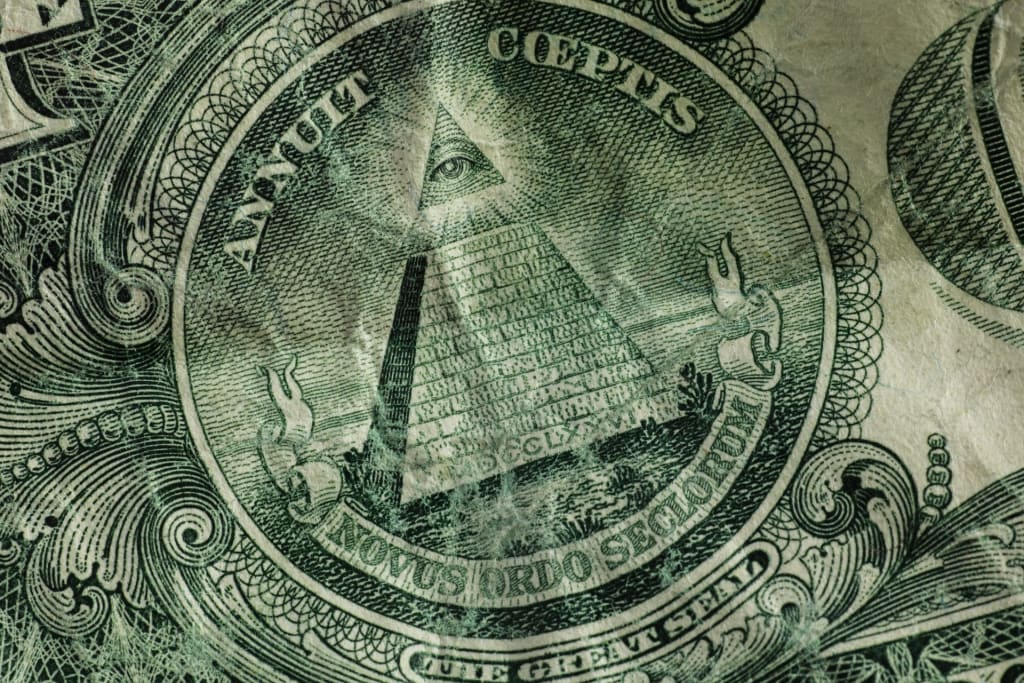Conspiracy Theories and Misinformation: Where Does Vocal Draw the Line?
Vocal's head of Content Moderation discusses the obligation of platforms to prevent the spread of misinformation and takes a look at a few interesting, and dangerous, conspiracy theories.

Section 10, Paragraph A of Vocal's internal Moderation Protocols begins with the following statement:
Vocal takes a cautious approach to the moderation of stories related to conspiracy theories, especially those that contain subject matters linked to real-world violence.
The ensuing pages go on to provide insight and guidance for Vocal moderators regarding subjects like:
- "What happens at Area 51?"
- "Did Aliens build Stonehenge?"
- "Elvis Lives?!"
... and my personal favorite:
- "Is Greta Thunberg a Time Traveler?"
Man's unanswered questions are many, and for that we are grateful. After all, where would humankind be without questions like:
"What is true knowledge?"
- Plato, 400 BC
Or:
"Does God exist?"
- Descartes, 1642
Or:
"What is the meaning of life?"
- Camus, 1942
These thoughts have stood the test of time as insightful, brilliant inquiries into our world and our existence. Questions like these, and the conversations they started, have shaped us and allowed humans to rise to unimaginable heights. Who knows where we would be without our ability to question and wonder.
However, these particular questions exist on a certain tier — a high tier, a tier that few reach in their lifetime. On a slightly more... ill-informed tier of postulation can be found... different questions. Questions like:
"Was global warming invented by the Chinese?"
"Does bleach cure Covid-19?"
"Do windmills cause cancer?"
- Donald J. Trump, sometime in the 2000s
And, while I wish that our time-traveling purveyor of common sense could be here to remind us that:
... she is unfortunately too busy and/or in another dimension. Ah, well.
Instead, here at Vocal we have protocols to help us moderate content that occasionally strays from "curious" into the realm of "dangerous."
When did we realize that we needed guidelines for conspiracy theories? And how are new guidelines created?
Well, if you watch "How I Met Your Mother," you might remember the episode about boogie boarding. More specifically, you might remember the sign outside MacLaren's Pub that reads:

I promise I'm going somewhere with this.
The crux of this "HIMYM" episode is simple: Where there's a sign, there must be a story. If the sign says "No Boogie Boarding," it stands to reason that, at some point, somebody looked at the sloping steps in front of the bar and either impulsively or ill-advisedly grabbed their boogie board and thought to themself:
"What's the worst that could happen?"
Many assume the same can be said for content moderation guidelines, and they're partially correct. If a platform receives a piece of content that contains, say, racial slurs, and they have no policies to enforce the moderation of this content, they must draft protocols and reactively protect the platform against hate speech. Much like a local government ordering a sign for "Deer Crossing" to be erected at the location where three cars have hit deer, a platform might construct protocols for hate speech after encountering three pieces of content containing racial slurs. Per the legalities of Section 230 of the Communications Decency Act, social media and publishing sites are allowed to do this.
I say all this because, before I started working for a publishing platform, I thought this was the only way protocols came to be; where there's a protocol, there must have been an incident. And yes, that is one way that new guidelines are created.
This "boogie boarding sign" methodology, however, is not best practice.
Drafting protocols in response to an issue or trend in culture is, as I said before, reactive action. The goal in crafting content moderation protocols, however, is to have well-rounded guidelines that can be interpreted or reinterpreted as needed in the event of an upheaval in society. At the very least, uprisings and trends should be anticipated, and platforms should not be caught flat-footed when, hypothetically, the President suggests a cure for COVID-19 that defies science. This is proactive action, and it is the goal of every publishing outlet that employs a means of content moderation (which most do, and all should).
That's why I'm proud of the fact that Vocal was prepared to moderate content related to dangerous (mis)information well before Jeffrey Epstein's death, Trump's quiet endorsement of QAnon, and the alleged "Election Collusion" of 2020. These theories and more are topics that we at Vocal ultimately divide into two categories:
Category 1: Non-harmful conspiracy theories
Many conspiracy theories have, over their lifespan (however long), tumbled into the bucket of "urban legends," or "myths." Not to say they have been proven, disproven, or dismissed, because for many that is certainly not the case. Rather, these topics have been bounced around so much that it is generally considered harmless to bring them up in conversation.
A few examples of "Category 1" conspiracy theories are:
- UFOs (innocuous small talk for the Thanksgiving dinner table)
- The JFK Assassination (no, the CIA did not kill JFK, Uncle Rick just needs to let this one go)
- Mattress Firm (but seriously, why is there a Mattress Firm on every block in NYC?)
At Vocal, when we receive submissions discussing these and other non-harmful conspiracy theories, we view them journalistically. We will usually publish these stories, as long as they meet our other guidelines.
Let's move on to the second category of conspiracy theories:
Category 2: Dangerous conspiracy theories
"Category 2" conspiracy theories are topics that, essentially, can be linked to real-world danger and violence. This is content that is dangerously detached from reality to the point that it puts human lives at stake, either in the form of being a catalyst to violent societal upheavals, or by putting individual lives in harm's way by denying science and scientific evidence.
Some examples of "Category 2" conspiracies are:
- QAnon conspiracies (as well as the existence of "Q," a supposed modern-day "Deep Throat" who holds all government secrets)
- 5G causes cancer (T-Mobile is really in the hot seat here)
- The "Plandemic" (a theory responsible for one of the greatest incitements of real-world dissettlement and unrest in our lifetime)
This is, of course, an evolving list, as man's irrepressible urge to theorize proves daily its unwavering longevity. The most recent addition to this category, unfortunately, is "2020 Election Collusion."
While the events of January 6, 2021, are still harrowingly fresh in our minds, it is important to acknowledge, with no attempt at eloquence or verbosity, that this election was secure, honest, and accurate, and that Joseph R. Biden Jr. should be peacefully instated as the 46th President of the United States. Any story submitted to Vocal that lends credence to allegations of voter fraud, or shows support for the insurrection in Washington, will not be published.
While it is inherently unfortunate that this list of "Category 2" conspiracy theories must exist at all, it is necessary for Vocal, and all publishing platforms, to recognize their responsibility to prevent and slow the spread of misinformation, especially misinformation that can lead to lives being lost. We believe it is imperative for Vocal moderators to be educated on all subjects that fall under the umbrella of conspiracy theories, and we enforce this rigorously in their training.
Our job is, and has always been, to keep Vocal safe. We thank you for your trust.
Now, because I have some time on my hands, and because I find all conspiracy theories fascinating (if only for their glimpse into the human mind), here are a few more conspiracies that we deem "dangerous," and about which everyone should be informed:
PizzaGate
While this conspiracy theory is fairly well-known, not everyone knows just how far its wildly unfounded tendrils have wiggled into government and society. Based around a small DC-area restaurant called Comet Ping Pong, PizzaGate proponents asserted that, in the basement of this unassuming pizzeria, was the hub of a legislatively-endorsed Clintonian child trafficking ring. So firm was the belief in the existence of this underworld mecca of political debauchery that, in 2016, a North Carolina man stormed the shop, assault rifle in hand, forced his way to the basement, and discovered...
Nothing, of course. Absolutely nothing, except pizza boxes and dust.
(He went to jail for four years.)
WayFair Trafficking of Children
I first learned of this conspiracy when, like many others, I found myself tempted by countless 5-star reviews to furnish my new apartment via this nationwide supplier of couches and home goods. Little did I know that beneath the surface of this sluggish and generally unnavigable website was an underworld of evil...
OK, but in all seriousness — the theory that Wayfair is using high-priced items denoted with girls' names like "Neriah" and "Alyvia" as encrypted codes to auction off children to high-paying elites is... "baseless" feels far too weak, but you get the idea.
The Elders of Zion
A literary forgery that erases the genocide of the 1940s and instead presents a deep-rooted plot by Jews for an eventual world takeover, The Protocols of the Elders of Zion is one of the most ambitious and dangerous conspiracy theories of all time. Penned originally in Russia and supposedly brought to the U.S. in the pocket of a Russian army officer, The Protocols found its way into the hands of Henry Ford, who would ultimately publish excerpts in his owned-and-operated newspaper, "The Deadborn Independent," as part of a series titled "The International Jew: The World's Foremost Problem."
The Protocols has but one redemptive element: A deeply disturbing example of how influential conspiracy theories can be to the fabric of society, it serves as a call to action for all publishing platforms to take earnestly its part in ridding our free speech from hate and persecution.
This story is meant to serve as a transparent look at how we operate behind the scenes. Here at Vocal, we believe we are doing our part, and we strive every day to do even more, to do even better, and to never let down our guard against content that puts our readers in danger.
Thanks for being part of this creative and hate-less community. Keep reading, keep asking questions, and keep letting us be part of your story. We live for it.
---
Joshua Luke Johnson is a senior content manager at Creatd and head of Content Moderation and Curation at Vocal.
About the Creator
Joshua Luke Johnson
Former Head of Content @ Vocal
Interview with Christopher Paolini: https://vocal.media/interview/christopher-paolini-interview-part-1-of-3
Reader insights
Outstanding
Excellent work. Looking forward to reading more!
Top insights
Compelling and original writing
Creative use of language & vocab
Easy to read and follow
Well-structured & engaging content
Expert insights and opinions
Arguments were carefully researched and presented
Eye opening
Niche topic & fresh perspectives
Masterful proofreading
Zero grammar & spelling mistakes
On-point and relevant
Writing reflected the title & theme





Comments (4)
So independent journalists aren’t welcome? If I said the richest family in the world is completely incognito because of the power they hold (and provided an investigative article to support said “theory”), would that be considered dangerous or benign? Or what if I asserted that vaccines and experimental medicine trials being pushed on Africa the most, despite Africa having the lowest COVID rates, is eugenics in practice being disguised as humanitarianism? I’m genuinely curious if there are any more concrete guidelines on what constitutes as “dangerous”. People use religion, sexuality, race, gender ideology, income, class, nationality, laws, science or even their fandom to justify violence— but correlation is not causation. I read this policy and it feels like a banning of books… I’m shocked that the comments are even open.
people think Greta Thunberg is a time traveler?!
I love what Daniel wrote in the comments! I wish you and your wife the best moving forward.
I am somewhat disappointed. First the thought that I need to be protected from someone else's ideas is condescending and speaks poorly of what you believe you readers ability is to present the truth or to criticize society. I venture to say that if George Orwell or Ayn Rand tried to publish on Vocals you would have censored them for "conspiracy theories." Besides the fact that conspiracy theories make great stories as long as people are not writing porn or actively promoting violence against other groups (not just depicting violence but promoting it,) I don't like anyone deciding what I can and can't read. Proactive censorship is injurious in that it only accepts what is publicly accepted in general and, history has shown, that the public is usually wrong. Conspiracy theories such as the Bilderberg Group and others have, also, been proven to be true over time. For four decades after WWII the Bilderberg Group was a conspiracy theory, now it is a fact and they meet openly. But it was formed at the end of WWII by the Prince of Lippe and had been meeting all the time that the media was laughing at people who talked about it as conspiracy theorists. As a Federal Investigator I know that the legal definition of a conspiracy is for two people to talk about an illegal act and for one person to make an overt action in furtherance of that act. So if two people were getting drunk and said, "Gee, that bank has a lot of money. Maybe we should just take it and pay our bills with it." and the other person pulls out their phone and looks up the bank address or even just a picture of the bank, then THAT is an active conspiracy. With such a low bar it is a safe bet that virtually any conspiracy you can think of is a real conspiracy because someone somewhere has thought about it and, even if someone else just wrote down a note, they have made an overt act in its furtherance. Too much censorship (or "moderation" as people like to call it,) is creating a fragile and uninformed society and crippled my wife because we were not informed of the dangers of a medical procedure that she had that all popular sources insisted was "safe and effective." This is the danger of moderation, in an effort to protect it ruins lives because no one person or committee can ever set themselves up as the arbiters of truth without doing immeasurable harm, of which they will probably never be aware.